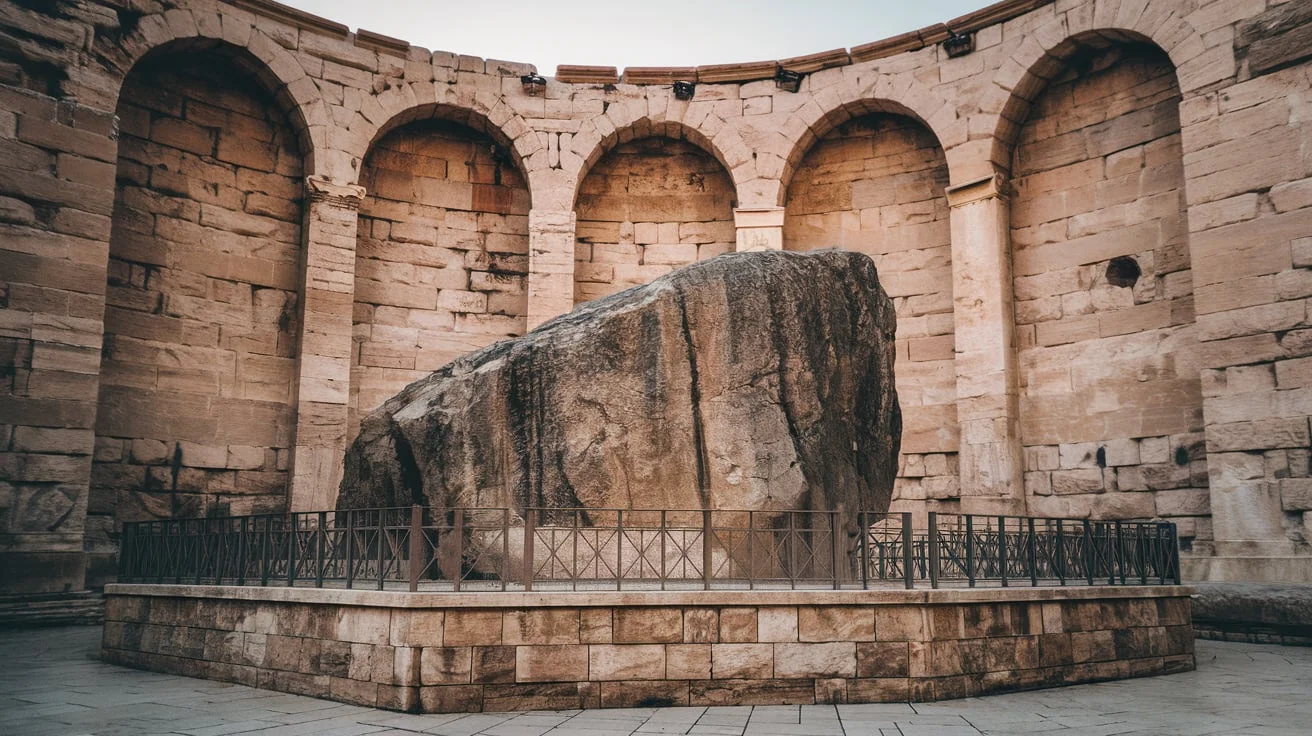Last Updated on May 22, 2025 by Muhammad Ramzan
The concept of the cornerstone is deeply embedded in both physical architecture and spiritual symbolism. This foundational stone, crucial in ancient construction, carries profound meaning in Christian faith.
This article delves into the multifaceted role of the cornerstone in Christianity, exploring its symbolism, significance, and impact on believers and the Church.
Understanding the Cornerstone: Definition and Origins
Historical Context
In ancient architecture, the cornerstone was the first stone laid in the construction of a building. This stone was critical because it established the foundation upon which the rest of the structure would be built. Its precision and placement were crucial for the stability and alignment of the entire building.
Ever found yourself juggling too many tasks, feeling overwhelmed by an endless to-do list? You’re not alone. Yoholist is designed to transform chaos into clarity, helping you regain control and focus on what truly matters. You’ll discover how Yoholist can revolutionize your daily routine, offering you the peace of mind and efficiency you’ve been searching for.
Biblical Foundation
In biblical times, the cornerstone was not just a practical component but also a symbol of strength and reliability. The term “cornerstone” appears frequently in the Bible, symbolizing a critical element in both physical and spiritual contexts. For instance, Psalm 118:22 refers to the cornerstone in the context of God’s plan and salvation:
“The stone the builders rejected has become the cornerstone.”
The Cornerstone Reveals Truth and Righteousness
Scriptural References
The cornerstone is often used in the Bible to represent truth and righteousness. In Isaiah 28:16, it is written:
“So this is what the Sovereign Lord says: ‘See, I lay a stone in Zion, a tested stone, a precious cornerstone for a sure foundation; the one who relies on it will never be stricken with panic.’”
This verse illustrates how the cornerstone is a divine assurance of stability and righteousness, symbolizing God’s unwavering truth.
Interpretations
Biblical scholars interpret the cornerstone as a symbol of God’s integrity and the foundation of justice and righteousness. For instance, the New Testament reaffirms this concept by presenting Jesus as the cornerstone of faith, embodying divine truth and moral integrity.
The Cornerstone as a Symbol of Stability and Foundation
Architectural Metaphor
In architecture, the cornerstone is the bedrock of a building. It ensures that the structure is built on a solid foundation, providing stability and alignment. This metaphor extends to the spiritual realm, where the cornerstone represents a solid foundation of faith.
Spiritual Implications
In a spiritual context, the cornerstone signifies the foundation of a believer’s faith. Just as a building cannot stand without a secure cornerstone, a Christian’s faith requires a firm foundation. This metaphor highlights the importance of building one’s life and beliefs on the teachings of Jesus Christ.
The Cornerstone and the Cross of Jesus
Christ as the Cornerstone
In the New Testament, Jesus is identified as the cornerstone, fulfilling the Old Testament prophecies. Ephesians 2:20 states:
“Built on the foundation of the apostles and prophets, with Christ Jesus himself as the chief cornerstone.”
This passage emphasizes that Jesus is the central figure upon which the Church is established. The cross, as a symbol of Jesus’ sacrifice, also represents the cornerstone of Christian faith.
Theological Significance
The identification of Jesus as the cornerstone underscores His role in salvation and the establishment of the Church. His teachings and sacrifice are the bedrock of Christian faith, providing a moral and spiritual foundation for believers.
The Cornerstone and Emotional Stability
Personal Impact
Understanding Jesus as the cornerstone can offer profound emotional stability. Believers who see Christ as their foundation often find a sense of peace and purpose, even amidst life’s challenges. The stability provided by this spiritual cornerstone can lead to improved mental and emotional well-being.
Testimonies
Many individuals report that their faith in Jesus as the cornerstone has helped them navigate difficult times. For example, testimonies from Christians who have faced personal trials often highlight how their faith provided them with inner strength and resilience.
Rejecting Christ and the Consequences
Biblical Warnings
The Bible warns of the consequences of rejecting Jesus as the cornerstone. Matthew 21:42-44 narrates:
“Jesus said to them, ‘Have you never read in the Scriptures: “The stone the builders rejected has become the cornerstone; the Lord has done this, and it is marvelous in our eyes”? Therefore I tell you that the kingdom of God will be taken away from you and given to a people who will produce its fruit.’”
This passage illustrates that rejecting Jesus has significant spiritual consequences, including the loss of participation in God’s kingdom.
Historical and Modern Perspectives
Historically, societies that have turned away from Christian teachings have faced various challenges. In modern times, individuals who reject Christ often struggle with a lack of spiritual direction and purpose. These consequences reflect the importance of the cornerstone in providing a stable foundation for life.
Your next verse awaits—discover powerful Bible truths on our Home Page now or read more articles for deeper insights
The Cornerstone and God’s Patience
Divine Patience
The cornerstone also reflects God’s patience and enduring commitment to humanity. 2 Peter 3:9 explains:
“The Lord is not slow in keeping his promise, as some understand slowness. Instead he is patient with you, not wanting anyone to perish, but everyone to come to repentance.”
God’s patience is symbolized by the cornerstone, representing His ongoing offer of grace and salvation despite human shortcomings.
Scriptural Evidence
Several Bible passages illustrate God’s patience, including His willingness to forgive and provide opportunities for repentance. The cornerstone serves as a reminder of this divine patience and commitment to humanity.
The Cornerstone and the Indictment of Rejection
Spiritual Judgment
Rejecting the cornerstone is viewed as a serious spiritual offense. The Bible describes this rejection as an indictment, leading to spiritual judgment and separation from God’s blessings.
Moral and Ethical Lessons
The concept of the cornerstone teaches important moral lessons about faithfulness and adherence to divine principles. The rejection of Jesus as the cornerstone serves as a cautionary tale about the consequences of turning away from fundamental truths.
The Significance of the Cornerstone in Building the Church
Church Foundation
The cornerstone is fundamental in building the Church, representing Christ as the central figure upon which the Church is established. Ephesians 2:21-22 emphasizes:
“In him the whole building is joined together and rises to become a holy temple in the Lord. And in him you too are being built together to become a dwelling in which God lives by his Spirit.”
This passage highlights the integral role of Jesus as the cornerstone in the spiritual construction of the Church.
Community and Unity
The cornerstone fosters unity and strength within the Christian community. By aligning with the teachings of Jesus, believers create a cohesive and resilient Church, built on shared faith and values.
The Role of the Church in Upholding the Cornerstone
Mission and Purpose
The Church’s mission is to uphold the teachings of the cornerstone and propagate its principles. This involves preaching the gospel, serving the community, and fostering spiritual growth.
Practical Applications
Churches can embody the principles of the cornerstone by promoting unity, supporting members, and engaging in outreach. Practical examples include community service projects, educational programs, and worship activities that reflect the teachings of Jesus.
Building the Church on the Cornerstone
Strategic Foundation
Building a church on the principles of the cornerstone involves aligning its practices and teachings with the teachings of Jesus. This strategic foundation ensures that the Church remains true to its mission and purpose.
Case Studies
Several churches have successfully built their foundation on the teachings of Jesus. For example, churches known for their strong community involvement and doctrinal faithfulness often attribute their success to their adherence to the principles of the cornerstone.
Walking in Faith and Belief in Jesus Christ
Daily Life
Incorporating the significance of the cornerstone into daily life involves living out one’s faith through actions, decisions, and relationships. Believers are encouraged to reflect the teachings of Jesus in their daily interactions and choices.
Faith Practices
Practical ways to live out the belief in Jesus as the cornerstone include regular prayer, Bible study, and participation in church activities. These practices help reinforce the foundation of faith and ensure that believers remain grounded in their spiritual journey.
Conclusion
The cornerstone, both as a physical and spiritual concept, plays a crucial role in Christianity. It symbolizes stability, truth, and the foundation of faith. By understanding and embracing the significance of the cornerstone, believers can strengthen their spiritual foundation and contribute to a unified and resilient Church.

Matthew Porter combines his passion for theology with an extensive study of dreams. His analytical approach and eloquent writing style make complex interpretations accessible, helping readers uncover the hidden messages in their dreams and connect with their spiritual path.










